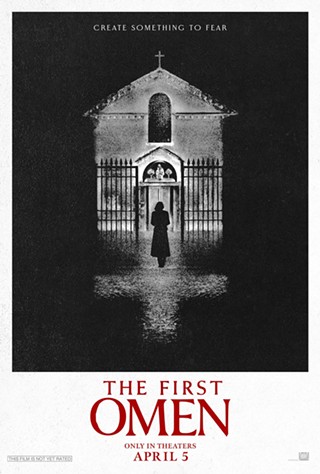TWO NEW COMEDIES opened this weekend: Bowfinger, starring Steve Martin and Eddie Murphy; and Detroit Rock City, starring rock music. While the mean-spirited and unfunny Bowfinger has been getting critical nods, Detroit Rock City has been taking it on the shins from reviewers, though I'm not quite sure why. I think critics "enjoyed" Bowfinger because it stars two old troupers, whose best days are obviously well-behind them. As tried-and-true commodities who'll never make films as successful as The Jerk and 48 Hours again, there's something endearing about Martin and Murphy. Watching them is kind of like watching Sinatra in his final years; just as a crooner who can no longer sing can warm our hearts by continuing to give half-assed renditions of his classics for the fans, so can two no-longer-funny comedians gain critical kudos for continuing to slog through the material long after it's ceased getting laughs.
The rumor is that Martin wrote Bowfinger in part as an act of revenge against former girlfriend Anne Heche, who is (supposedly) the inspiration for the character "Daisy." Daisy, played by the ubiquitous Heather Graham, is a seemingly sweet Midwestern girl. She comes to Hollywood to be a star, attempting to increase her odds by sleeping with whomever she believes can get her the most screen time. As she screws her way through the film she winds up coupling with "the most powerful lesbian in Hollywood." Subtlety was never the forte of "wild and crazy guy" Steve Martin.
Steve Martin plays Bobby Bowfinger, a second-rate director who tries to get his big break by filming a movie with hot action star Kit Ramsey (Murphy). Since there's no way Ramsey would consent to be in a Bowfinger film, Bowfinger just has actors run up to Ramsey on the street and say their lines. Hiding out with his camera crew of illegal aliens, Bowfinger records it all for posterity, leading Ramsey to believe that there's a conspiracy of space aliens out to steal his gonads.
This seems like a great idea for a comedy, but Martin forgets that, when writing a comedy script, certain key elements need to be included in order to keep an audience interested. Elements like "comedy," "humor" and even "funny parts." "Funny parts" are very important in the creation of a successful comedy.
There are certainly a few laughs in Bowfinger, such as a poster for Kit Ramsey's last film, Explicit Endeavor. Unfortunately, the characters in Bowfinger are paper-thin, and without the yuks to keep you at least laughing at them there's not much reason to stay in your seat while they scheme their way through the film.
ODDLY, DETROIT ROCK City, which combines two of the shallower forms in cinema -- the teen film and the rock film -- manages to create much more fully fleshed out characters than Martin does (despite his many years of wearing an arrow on his head, saying that hilarious catch-phrase "excuse me," and starring in such never-to-be-forgotten comedy classics as The Out-of-Towners and Sergeant Bilko, even if he didn't star in the never-to-be-forgotten, classic versions of those two titles). The basic premise of Detroit Rock City is fairly straightforward movie stuff: four teenage boys are desperately trying to get to a KISS concert. Luckily, they're constantly thwarted and must resort to the sort of schemes that were introduced in '70s TV sitcoms with the line, "Potsie, I've got a crazy idea, but it just might work!" There are a half-dozen of these mini-plots within the film, as if several years worth of Laverne and Shirley, Charles in Charge and Three's Company had been alchemically condensed into their purest essence and distilled into cinematic form.
Whereas the scheme in Bowfinger is supposed to support the entire plot, the little schemes in DRC don't have to carry so much weight or be as believable, and they work much better on the level of self-conscious self-parody. The production values of the low-budget DRC are also, oddly, much more sophisticated than Bowfinger's: wipes, split-screens, tints and distorting lenses evoke the style of the film's era, the late 1970s, and make the rather flat camera work of Bowfinger seem uninspired.
While DRC does suffer from some of the maladies of the contemporary teen film, such as a touch of gross-out humor (audience alert: the "vomit shot" has replaced the "poop shot" as the obligatory Hollywood gross-out gag), it mostly avoids anything too egregious.
It also does something that any cheap film should learn to do, and that's keep things moving. There's no excuse for a trashy movie that slows down; and in the course of DRC's 95 minutes it manages to squeeze in two thwarted crimes, two rescues of rock chicks in distress, two deflowerings, and a bunch of guys agreeing to beat each other up to the sounds of "Carmina Burana." Frankly, almost nothing is funnier than consensual violence played out to medieval choral music.
The only thing that was missing from Detroit Rock City was a Jack T. Chick-style ending where the young KISS fans learn that they "made a mistake" and have their souls harvested by Beelzebub. But even without Satan, this movie manages to be a lot of fun, which is more than I can say for the uncomfortable and occasionally repellent Bowfinger. As fellow film critic and semi-competent rock guitarist Greg Petix said, "I only wish I'd seen Detroit Rock City when I was 11."
Bowfinger and Detroit Rock City are both playing at select theaters citywide. See Film Times (page 33).










